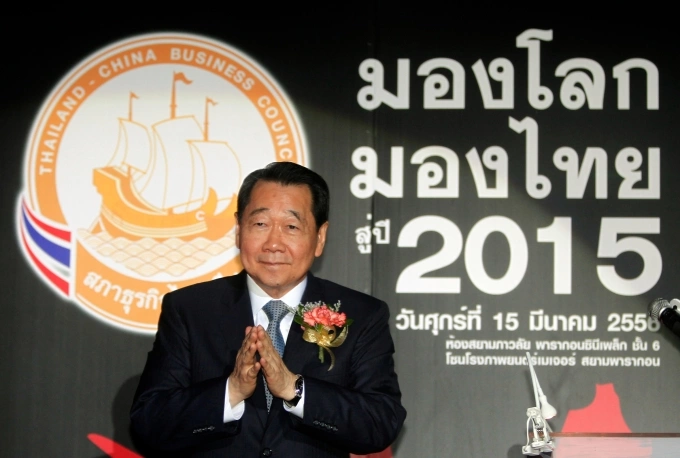The family, led by Dhanin Chearavanont, is the 19th richest in the world, according to Bloomberg‘s ranking of the 25 wealthiest families, which features two from Southeast Asia. The other is Indonesia’s Hartono family.
The Chearavanont brothers had also topped Forbes magazine’s Thailand billionaire list for nearly a decade before losing the crown to the Yoovidhyas, the family behind energy drink giant Red Bull, earlier this year.
The Chearavanonts’ wealth stems from agribusiness behemoth Charoen Pokphand (CP) Group, which the brothers co-own. It is one of the largest conglomerates in Thailand, boasting revenues of 3.32 trillion baht (US$97.28 billion) last year and a portfolio comprising 14 business groups with a presence in 21 countries and economies.
The group is one of the world’s leading animal feed and livestock producers and also operates in sectors such as e-commerce, finance, healthcare, real estate, telecommunications, and automotive.
 |
|
Dhanin Chearavanont gestures upon arrival at a Thailand-China Business Council seminar in Bangkok, March 15, 2013. Photo by Reuters |
The company’s origins date back to the 1920s when Chia Ek Chor and his brother set up a small store in Bangkok called Chia Tai, which sold seeds imported from their family business in China to Thai farmers. It changed its name to its current one, which translates to “prosperity to consumers” in Thai, in 1946.
As CP expanded, Dhanin, the youngest of Chia’s four sons, sought to transform it from a family business to a modern company by bringing in outside professionals, he wrote in his autobiography series published by Nikkei Asia.
“Novices can only run a business for so long before its operations become too large and complex for them to handle,” he said, adding that experts can use their knowledge to generate profits for the company.
“I never studied economics, but I learned from experience that a separation of ownership and management is important.”
He persuaded his family members, who were actively involved in running the firm, to become shareholders while allowing him to manage the business. In return, he promised to pay them more than the firm did. He also treated them well and never attempted to take over their shares, so none of them were dissatisfied with the arrangement.
“It was a testament to strong family ties that his three elder brothers were willing to recognize Dhanin’s talents and relinquish managerial responsibilities entirely to him even though they maintained their co-equal shareholdings in CP,” a case study on the group by Harvard Business School said, as cited by Bangkok Post.
Dhanin became CP’s chairman in 1969 and diversified it extensively, branching into various sectors both in Thailand and overseas.
He also prohibited the children within the family, including his three sons, from joining CP’s core business of agricultural and food products.
“You should place your children at the feet of masters rather than make them bosses right away,” he told TIME magazine in a 2004 interview.
Instead, his children took on several other operations within the group, including its cable TV business, retail and hypermarket, and telecommunications.
CP ventured into Thailand’s telecom and mobile phone market in 1990 by purchasing a stake in TelecomAsia, which later became True Corp.
It was hit hard by the 1997 Asian financial crisis, like other Thai firms at the time. Dhanin, who had planned to retire just before the crisis hit, was forced to sell off company assets to repay loans, including stakes in a Chinese motorcycle manufacturer and a brewery—businesses he believed could have prospered.
“It felt bad, but I always believed we would get it back tomorrow,” he said of the decision.
He managed to cut CP’s debt and set up a new brewery and a motorcycle factory five years after that.
Some of the group’s notable acquisitions over the years include China’s Ping An Insurance for $9.4 billion in 2012 and Thai retailer Siam Makro for $6.6 billion in 2013.
Dhanin stepped down as CP’s chairman and CEO in 2017 and, after discussing with his brothers, appointed his eldest son, Soopakij, as chairman and his second son, Suphachai, as CEO. Dhanin still serves as the conglomerate’s senior chairman.
CP bought Tesco’s hypermarket chains in Thailand and Malaysia for $10.6 billion in 2020.
Amid the Covid-19 pandemic, the company spent $3 million building a face mask factory with a capacity of 100,000 units per day while supplying hospitals with free food and contributing to pandemic relief efforts in Thailand.
Last year, its telecom arm, True, merged with rival Total Access Communications, creating one of the two leading players in Thailand’s telecom and mobile phone industry, The Business Times reported.
Dhanin was honored with the Malcolm S. Forbes Lifetime Achievement Award at the Forbes Global CEO Conference last September, in recognition of his status as one of Asia’s most successful business tycoons.
Reflecting on the challenges throughout his career, he noted how much CP has grown from its humble origins.
“When I took over the business, I didn’t imagine it would grow to today’s scale,” he said at the event.
In his autobiography, Dhanin credited CP Group’s success to the upbringing he and his siblings received, which helped them expand the business within the Chinese market, and the support from Thai people, who embraced the family despite their foreign origins.
“Had we not been headquartered in Thailand, the CP Group of today would not exist,” he said. “The story of CP Group is the story of the Chinese businessmen who transcended national borders and the Thai people who accepted them.”





